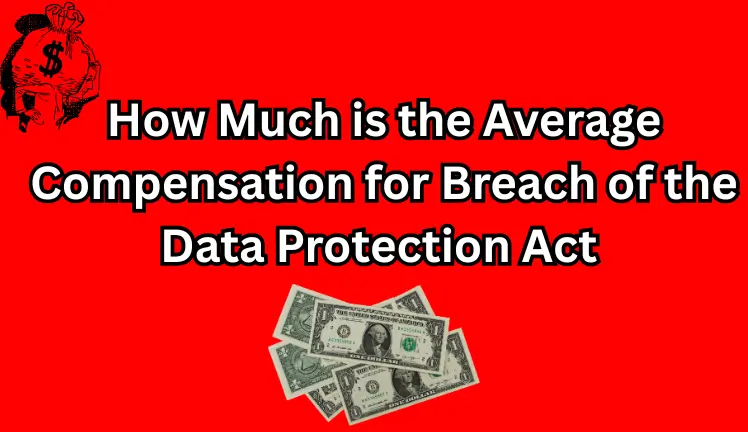Average Compensation for Breach of the Data Protection Act
When personal data is mishandled, exposed, or misused, it may be a violation of the Data Protection Act (DPA), and individuals affected by such breaches might be entitled to compensation. However, the average compensation varies significantly depending on the specifics of the case, including the severity of the breach, the type of personal data involved, and the losses incurred by the affected individuals.

In the United States, although the Data Protection Act is not universally applicable as a specific law (in the way it is in Europe with the GDPR), similar protections are enforced through various state laws and acts such as the California Consumer Privacy Act (CCPA), and federal laws like HIPAA (Health Insurance Portability and Accountability Act).
Average Compensation in Data Protection Breaches
Compensation for a breach under the Data Protection Act or similar laws can vary dramatically based on the circumstances of the case. Below are some key factors and examples that impact the average compensation:
1. Nature of the Data Exposed
- Highly Sensitive Information: If sensitive data, such as Social Security numbers, financial records, or health information, is exposed, the compensation amount tends to be higher due to the increased risk of identity theft and fraud.
- Basic Personal Data: For breaches involving less sensitive personal information, such as names and contact details, the compensation may be lower, though still significant in cases where individuals can show tangible harm.
2. Recent Data Breach Settlements
- Equifax Data Breach (2017): Affected 147 million individuals. The settlement, which was part of a larger class action, amounted to up to $425 million. Payments to individuals ranged from small amounts for those without documented fraud to larger payouts for victims with confirmed identity theft or fraud claims.
- Marriott Data Breach (2018): This breach impacted 339 million customers. Compensation here was a part of an ongoing settlement, and payouts to affected individuals could include reimbursements for out-of-pocket expenses and for time spent dealing with the breach.
3. Compensation for Identity Theft and Fraud
In cases where individuals experience identity theft or financial fraud as a result of the breach, compensation can increase. Individuals who can show proof of actual losses can often receive more substantial compensation.
4. Class Action Settlement Payouts
Most data protection breaches lead to class action lawsuits. These payouts depend on the size of the settlement fund and the number of people making claims. For instance, a large-scale breach may result in smaller individual payouts because the settlement is divided among a large number of claimants. However, individuals who document actual financial losses may receive higher compensation.
Factors Influencing the Amount of Compensation
Several key elements determine the amount of compensation you could be entitled to in a data breach case:
- Severity of the Breach: Breaches involving large-scale exposure of sensitive or personally identifiable information typically lead to higher compensation amounts.
- State and Federal Laws: The type of data protection laws applicable (e.g., GDPR in Europe, CCPA in California, HIPAA for health data) can influence how much compensation is available, with some states offering more protection and higher potential payouts than others.
- Documentation of Losses: Proving that you suffered financial harm or identity theft as a result of the breach can lead to more significant compensation amounts.
- Settlement Terms: Class action settlements typically distribute funds based on the number of claimants and the damages they can prove, so individual payments may vary.
T-Mobile Customers’ Data Breach Settlement Payouts Delayed Until May 2025: What You Need to Know
$400 Stimulus Check: Everything You Need to Know
What to Do If You Are Affected by a Data Protection Breach?
If your personal data has been compromised, it’s essential to take action quickly:
- File a Claim: For class action settlements or other legal remedies, ensure you file your claim within the stipulated deadlines.
- Document Losses: Keep records of any financial loss or fraud resulting from the breach, as these can help increase your compensation.
- Monitor Your Accounts: Use identity theft protection services to safeguard against future fraud.
As a finance news writer at sirfal.com, I specialize in breaking down complex economic trends, market updates, and investment strategies into clear, actionable insights. My mission is to empower readers with the knowledge needed to make informed financial decisions. Thank you for engaging with my articles; I hope they add value to your financial journey.